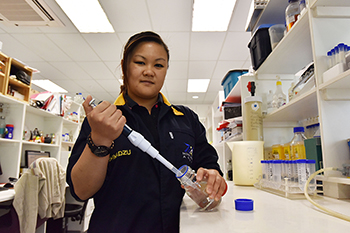Latest News Archive
Please select Category, Year, and then Month to display items
01 October 2019
|
Story Xolisa Mnukwa
|
Photo Xolisa Mnukwa
 From the left; Gift Taku, 2019 Doty winner; Reabetswe Mabine, Doty Coordinator Tshepo Zweni, first runner-up and Jacobeth Selinga, second runner-up
From the left; Gift Taku, 2019 Doty winner; Reabetswe Mabine, Doty Coordinator Tshepo Zweni, first runner-up and Jacobeth Selinga, second runner-up
The votes have been tallied, and after much deliberation, the UFS is proud to announce Gift Taku as the winner of the 2019 KovsieGear Designer of the Year (DOTY) Competition!
Tshepo Zwane and Jacobeth Selinga won second and third place respectively, with innovative designs that complied with the assessment requirements, based on originality of the design, adherence to the brand guidelines, creativity, and other criteria.
Gift’s design triumphed with 845 votes on the UFS KovsieLife webpage, as well as in the presentation in front of a judging panel.
Since 2016, KovsieGear has been discovering local (UFS staff and students) graphic designers and giving them a platform to showcase their work through DOTY, which runs annually. The aim of the competition is to support local talent by giving entrants an opportunity to come up with creative designs that are unique to the university and which will be used on limited-edition apparel in the store, as well as getting featured in the KovsieGear catalogue.
The competition has since fashioned the best clothing-logo designs the university has ever seen and continues to motivate and empower students to make positive contributions to the Kovsie campus culture and brand.
For more information about DOTY contact Reabetswe Mabine at MabineR@ufs.ac.za
The winning design by Gift Taku:

The impact of personal care products on water resources in the Free State
2015-12-14

Jou-an Chen
Photo: Charl Devenish
|
Water is of the utmost importance in personal hygiene. Most people can hardly have a day go by without taking a shower in the morning and at night. However, it is this very habit that is increasingly polluting the water resources in South Africa.
Contaminants found in pharmaceutical and personal care products have been accumulating in water masses in recent years. These contaminants especially refer to hormones in medication, as well as colouring agents and fragrances used in soap, shampoo and body lotions.
“Little information and data are available on the prevalence of these contaminants, and on how high the level of pollution really is,” says Jou-an Chen, researcher in the Department of Microbial, Biochemical and Food Biotechnology at the UFS.
Her research particularly focuses on the prevalence and impact of those contaminants.
“Because these substances have not been properly investigated, we are not sure how widely it occurs and whether it is harmful to the environment. It was precisely the lack of information that has inspired me to investigate further.”
“If we could identify the contaminants and what it is doing to the environment, it could make a valuable contribution to directives on water quality standards.”